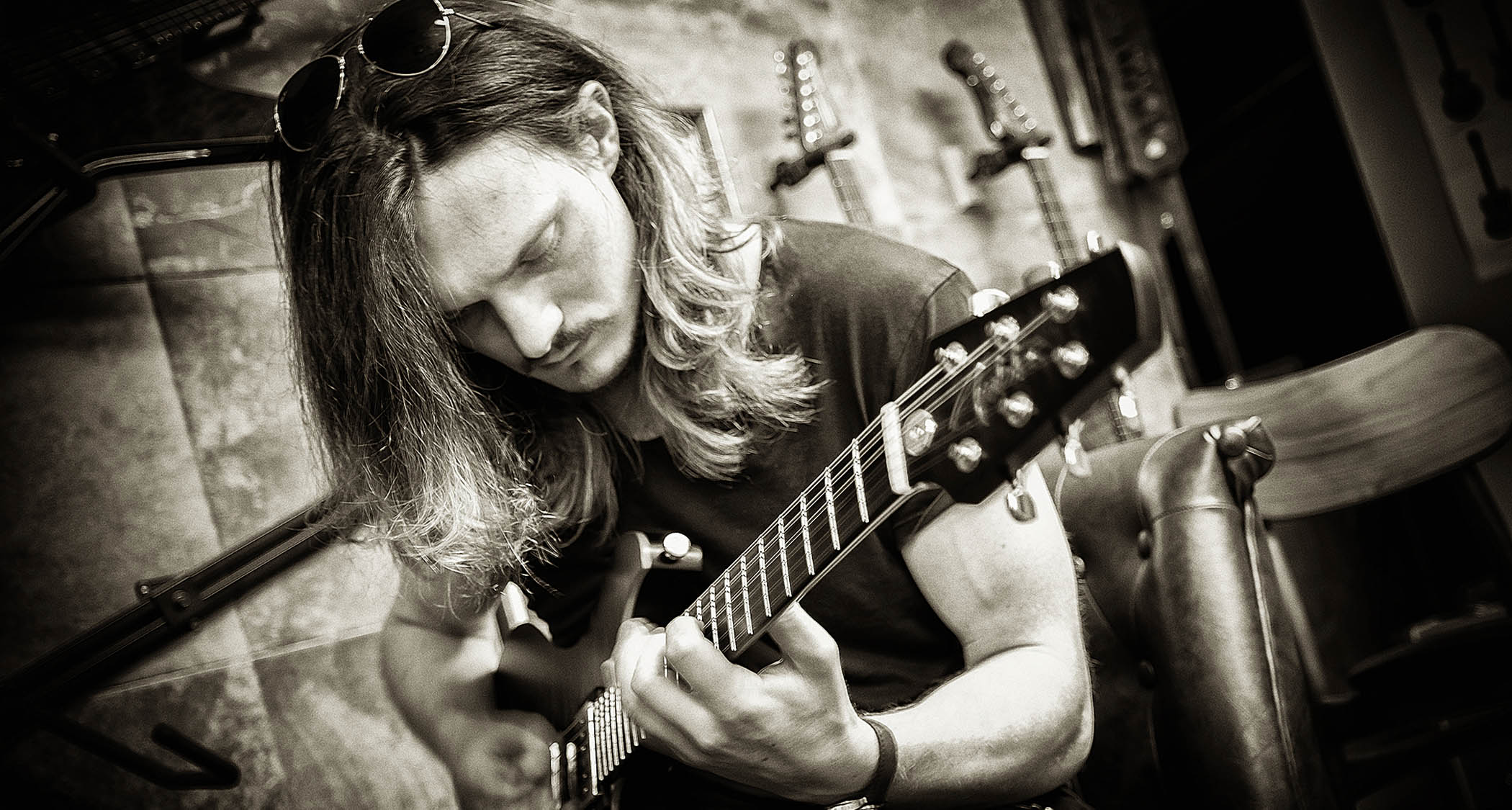“I love Alter Bridge, but more Myles Kennedy’s playing, rather than Mark Tremonti. Myles goes for the gross notes, which I really like”: Meet James Frankland, the classical-loving instrumentalist fusing Rachmaninoff and Guns N’ Roses
Frankland is taking influences from all across the musical spectrum to forge a sound that is all his own. He unpacks his journey from 13-year-old rookie to debut album, Fate’s Right Hand

James Frankland has made a name for himself as an instrumental guitar player who’s able to bring intricate layers into his music, as we see on his latest release, Fate’s Right Hand. However, he didn’t find an immediate connection to music.
“I first started playing when I was seven, but I didn’t like it for about six years,” he says. “Then when I was about 13 there were YouTube and Ultimate Guitar tabs, so I could access Joe Satriani and Guns N’ Roses lessons. It was a good time for learning.”
Challenging players
James explores a range of moods across Fate’s Right Hand, from the aggressively charged Stalemate to piano-accompanied slowy In the Depths. It displays an ability that has been honed through much listening and playing.
“Guns N’ Roses was definitely the one that got me into guitar,” he says. “After that probably Alter Bridge, but more Myles Kennedy’s playing, rather than Mark Tremonti. Myles goes for the gross notes; he’ll hammer in the b5 and he gets away with some nasty notes, which I really like.
“Another one is Jeff Beck – it’s an acquired taste, but once I got my head around it I thought he was untouchable. I managed to see him before he passed away. That was a cool concert.”
When classical meets rock
Like many instrumental guitarists before him, James found classical music entering the mix. “I wanted to push the piano and guitar accompaniment on this one,” he explains. “When I was writing I was listening to a lot of music, but a big one was Rachmaninoff and his classical piano stuff because he has some really moody chord progressions.
“It made it quite a challenge – the sound takes up a big frequency spectrum. There’s super low and high there, but all of the ideas began on the electric guitar. There are so many instrumental rock albums, I really wanted to find something that hadn’t been done so much, like the piano accompaniments.”
Get The Pick Newsletter
All the latest guitar news, interviews, lessons, reviews, deals and more, direct to your inbox!
Audience participation
When it comes to performing live, James likes the idea of a more interactive show, where the audience can engage with the artist.
I’d like to do some clinic dates. I’ve always liked those and it’s partly what drew me to the instrumental side of music and gear demos
“I’d like to do some clinic dates,” he says. “I’ve always liked those and it’s partly what drew me to the instrumental side of music and gear demos. The clinic shows give the audience the opportunity to get to know the performers a bit more; they get to learn why they write the way they do and use the gear they use.
“It’s a bit like a guitar shop tour,” he continues. “There’s a much smaller audience and you might be on for an hour and a half, but you’ll only play four or five songs in that time and the rest is spent answering questions. I’ve always been into that kind of performance. It’s also a bit less daunting!”
Deep listening
James is a meticulous audiophile, with his preparation for a new album coming down to the finest detail. Much of this prep comes from further listening.
“I’m interested in a lot of aspects of [creating music],” he tells us, “so when it comes to composition, a lot of it comes from listening to other artists for specific areas. It comes down to what flavours I want to absorb. When we play we think we know what should come next, but that changes with listening tastes.
“I’ve been trying to train my ear towards a new set of intervals or chords. For this one, as well as classical music for augmented chords, I was listening to Muse a bit for harmonies, too. It’s hard when doing instrumental music to keep it evolving and not just do the same thing again.”

Angry guitars
“The main rule was single-coil guitars for lead parts,” he says. “I really like vintage Japanese Fenders. A lot of this one was done on a 1989 Japanese Esquire: just one pickup, super-round fretboard and tiny frets. I liked it because you have to hang on – it’s the angriest guitar I’ve played! I also used a Chapman ML3 Standard; like the Esquire, it’s not an expensive guitar, but it felt right and that’s the important thing.”
Elsewhere in James’s rig is a special collaboration with Ambler Custom Guitars that resulted in the dual Seymour Duncan ‘Phat Cat’ P-90-loaded Capulet model, which has a master-grade 5A quilted maple top, swamp ash body and quarter-sawn roasted maple neck. A Victory V40 The Duchess and Orange OR15 make up his backline.
- Fate's Right Hand is out now via Bandcamp.
Glenn Kimpton is a freelance writer based in the west of England. His interest in English folk music came through players like Chris Wood and Martin Carthy, who also steered him towards alternate guitar tunings. From there, the solo acoustic instrumental genre, sometimes called American Primitive, became more important, with guitarists like Jack Rose, Glenn Jones and Robbie Basho eventually giving way to more contemporary players like William Tyler and Nick Jonah Davis. Most recently, Glenn has focused on a more improvised and experimental side to solo acoustic playing, both through his writing and his own music, with players like Bill Orcutt and Tashi Dorji being particularly significant.
“I was in a frenzy about it being trapped and burnt up. I knew I'd never be able to replace it”: After being pulled from the wreckage of a car crash, John Sykes ran back to his burning vehicle to save his beloved '76 Les Paul
“A virtuoso beyond virtuosos”: Matteo Mancuso has become one of the hottest guitar talents on the planet – now he’s finally announced his first headline US tour












